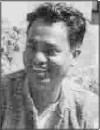Lest we forget
Prof Munier Choudhury
Shamsher Chodhury
This 14th December 2003 was the 32nd Anniversary of my illustrious brother's kidnapping. My brother and I were watching from the outer balcony of our ancestral home in Central Road, the Indian fighter jets flying right over our head, apparently hurling rockets at a house where presumably the then Commander of the Pak Armed Forces General Niazi had taken refuge. It was now 1145 am, the shelling and rocketing which began around 7 am had come to a sudden halt. My mother called out from the inner yard of the house opposite the outer verandah on the ground floor, "Now that there is some respite from the air raids, the two of you should have a quick shower and have lunch. I am laying the table". At this we both came down and my brother went for his bath at the makeshift bathing place which was located at the inner yard of the house having a bucket, a plastic mug and a water tank capable of storing about ten to twelve buckets of water on a six by three feet of concrete platform. At about this time as I was waiting for my brother to finish his bath and make way for me I saw a microbus camouflaged in mud had stopped right in front of our main outer entrance and about three or four young men alighting from the bus, all in militia uniform. All had rifles in their possession. The two of them were making rattling sounds beating on the lock hanging from the large gate made of wrought iron apparently trying to attract attention of the inmates of the house. I was watching all this from the window of one of the rooms on the ground floor, which provided a clear view of the gate and the front yard including the street right across. My first reaction was to ignore, wait and watch and at the same time hoping that they would give up and disappear. No such thing happened. They seemed determined and now even began to shout. Seeing this I finally came out and decided to face these people who appeared from nowhere. Besides I was quite apprehensive of their purpose since the entire city was under curfew imposed by the Pak Army. As I approached the gate one of the three people now standing on the outer side of the closed gate asked me to open the gate to which I responded by saying that I would like to know the purpose of their visit. The three of them said in one voice that they had come to see "Munier Sir". I was now getting somewhat nervous and told them that they could not see him since he was unwell. At this, one of them looked at me angrily and asked me to open the gate in a terse voice. I felt I could no longer resist them from coming into the yard. After some exchange of words leading to arguments and counter arguments about my brother being sick and his inability to meet them, I finally asked these people (who I later learned to be Razakars) to wait till I inform my brother. As I went in, I found my brother standing in front of the glass window located on the middle section of the stairs, still in a vest and a Lungi. Before I could say something, he wanted to know if these people had come to see him. Having had confirmation from me he asked me to tell them to wait. A little while after he returned wearing a Punjabi (a traditional long sleeved shirt reaching way below the knee) and the Lungi and in a pair of slippers. As he approached the Razakars , they greeted him and said that they had come to take him to the Police station for some questioning. At this my brother wanted to see their authority by way of a Warrant of Arrest. After considerable exchange of words the Razakars could neither persuade my brother to accompany them nor could they produce any document in support of his arrest. As matters came to a pass my brother refused to accompany the Razakars. As I was watching the proceedings standing beside him, one of the Razakars all too suddenly rushed behind my brother and held the gun pressed at his back ordering him to move. I was completely dumbfounded at the sudden turn of events and followed my brother to the entrance door of the bus. And now as he was entering the bus he turned to me and said " Rushdi (a name by which my family used to address me) I better go." Epilogue 32 years have gone by, since that frightful incident, I have neither seen nor heard from him. To this day I keep asking myself: "Is he dead, if so who killed him and why? Was he tortured to death? Who was he thinking of before the end came? Was he thinking of his mother whom he left waiting at the dining table to join her? Or was he thinking of his wife and children whom he had left behind?" My mother has left this world (June 2000). I am glad that at least her long and painful wait for her son was over. As for me the gaping wound caused since my brother disappeared still remains, yet I feel no real pain. I have learnt to live and cope with the tragedy. But what I find even harder to deal with is the current state of our beloved Homeland. The tragic state of our country has long overshadowed my personal loss.
|

Prof Munier Choudhury |